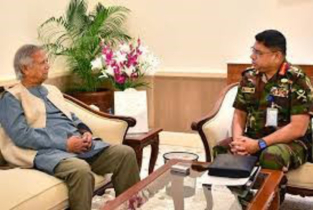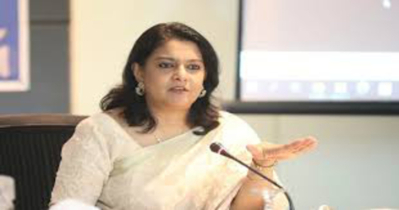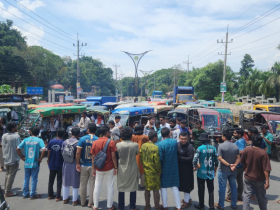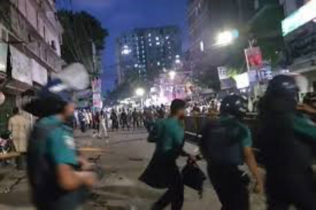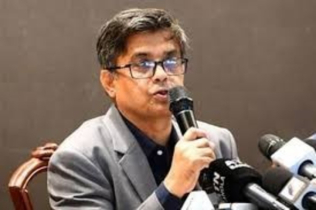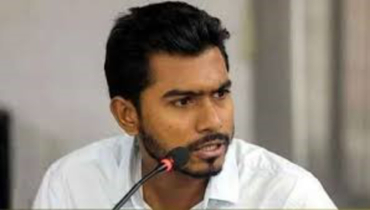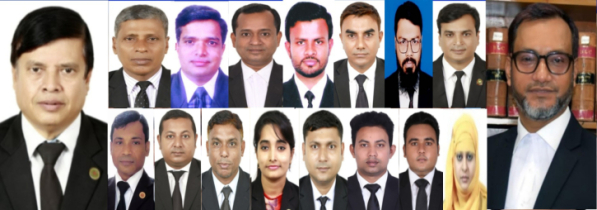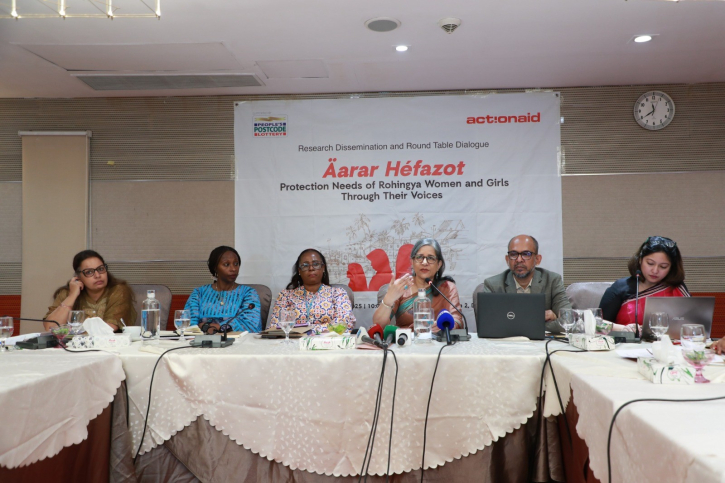
On the eighth year of displacement from Myanmar’s Rakhine State, ActionAid Bangladesh has released a new study exploring the protection risks and future aspirations of Rohingya women and adolescent girls living in Bangladesh.
The research sheds light on the multiple challenges shaping their lives. According to the study, sexual harassment was identified across all camps as the ‘Top Concern’. Child marriage and polygamy have become widespread, while nearly half of respondents (48%) stressed the urgent need for counselling for men and boys. The proliferation of armed groups and drugs within the camps further threatens the security and wellbeing of women and girls.
On the question of the future, most women (ranging from 50% to 82% depending on the camp) desired safe and dignified return to Myanmar, while a smaller proportion of younger participants said they wished to migrate to a third country.
The study calls for the immediate establishment of confidential, in-person, gender-sensitive reporting system with strong referral pathways, to supplement and bolster existing mechanisms and long-term solutions.
The findings were presented at a research dissemination and dialogue event titled “Äarar Héfazot: Protection Needs of Rohingya Women and Girls Through Their Voices” held in Dhaka on Sunday, 31 August. The event brought together representatives of the United Nations, embassies, local and international NGOs, donor organisations, researchers, experts and the media.
The session opened with an overview of ActionAid Bangladesh’s humanitarian work by Md Abdul Alim, Head of Humanitarian Programme, followed by the research findings presented by Tamazer Ahmed, Manager, Policy Research and Advocacy. Farah Kabir, Country Director of ActionAid Bangladesh, then facilitated a dialogue on the protection needs of Rohingya women and girls.
Key discussions from the dialogue:
Participants stressed the urgent need to strengthen protection for Rohingya women and girls, noting that the findings are not just data but the voices of refugee women themselves, reflecting their lived realities.
Farah Kabir, Country Director of ActionAid Bangladesh, said: “Our research was participatory, with Rohingya women themselves trying to speak about their lives. We sought to amplify those voices. These women have been here for nearly eight years, after fleeing persecution in Myanmar. At the beginning there was no shelter; some improvements have been made since, yet violence against them has not diminished - only changed in form.”
She underlined the need for immediate rights-based and gender-sensitive strategies: “The research clearly shows that Rohingya women and girls today face multiple risks. Strategic change is essential, and we must adopt long-term, rights-based and gender-sensitive measures to ensure their protection.”
Speakers further emphasised that the crisis should not be seen in isolation but as a social, economic and humanitarian issue requiring comprehensive solutions. The dialogue highlighted that child marriage, gender-based violence, and restrictions on women’s mobility stem not only from entrenched patriarchy but also from the growing insecurity inside the camps and lack of basic services.
Recommendations included ensuring well-lit, safe toilets and bathing facilities, recruiting female security staff, and establishing women-led protection committees. Strengthening law enforcement to curb the influence of armed groups and improving access to legal aid were also stressed.
Gitanjali Singh, Country Representative, UN Women, called for protection mechanisms to extend beyond women and girls to include other vulnerable groups, including transgender and gender-diverse communities. She urged reconsideration of funding cuts that disproportionately impact women and girls in crisis contexts.
Juliette Murekeyisoni, Deputy Country Representative, United Nations High Commissioner for Refugees (UNHCR), noted: “Women’s economic dependency and patriarchal barriers remain major challenges, while men’s disengagement further limits progress. The perspectives of affected women and girls must directly inform programmes and policy decisions.”
Hasina Rahman, Country Director, IRC, emphasised integrating education into women’s empowerment programmes to tackle root causes of vulnerability. She warned that the withdrawal of U.S. funding risks fuelling increases in GBV, IPV and other forms of violence, and stressed the need for close monitoring of its consequences.
Other participants highlighted the importance of counselling for men and boys to change attitudes, and the expansion of women-friendly spaces, education and livelihood opportunities to promote empowerment and reduce risks.
Research Methodology:
The study, supported by ActionAid UK and funded by People’s Postcode Lottery, was carried out in collaboration with local partner Agrajattra. Conducted under the title “Women’s Protection in Neglected Crises Research Project – Bangladesh: Äarar Héfazot (‘Our Protection’ in Rohingya)”, it sought to understand both the protection risks faced by Rohingya women and adolescent girls and their visions for the future.
The feminist, participatory and community-led research engaged 96 women and adolescent girls — 66 from camps 1E, 8E and 5, and 30 from the host community in Ukhiya. Most participants were aged between 16 and 30. Rohingya and local women were engaged as co-researchers through the use of participatory tools to ensure their experiences and priorities were directly reflected in the findings.
Key Recommendations:
Ensure safe, gender-segregated toilets and bathing facilities with proper lighting.
Recruit female protection staff and establish women-led protection committees.
Strengthen law enforcement to reduce the influence of armed groups
Improve access to confidential, gender-sensitive, survivor-centred reporting systems.
Introduce awareness and counselling programmes for men and boys.
Expand women-friendly spaces, education and livelihood opportunities to enhance empowerment and reduce risks.
The event was attended by Laila Jasmin, Programme Manager for Governance and Human Rights at the European Commission; Mushfiqua Satiar, Senior Policy Advisor on Gender and Civil Society at the Embassy of the Netherlands; Kaniz Fatima, Partnership Coordinator at NRC; Arslan Sabyrbekov, Governance Advisor at GIZ; and Neelima Akhter Chowdhury, Executive Director of Agrajattra, along with representatives from UN bodies, embassies, local and international NGOs, donors, academics, experts and media professionals.
TH

.png)

